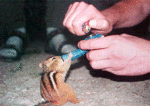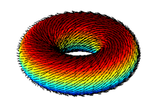Helium
| ||||||
| General | ||||||
|---|---|---|---|---|---|---|
| Name | Helium | |||||
| Symbol | He | |||||
| Number | 2 | |||||
| Physical Properties | ||||||
| Melting point | 156.7 °C, or maybe 156.7 °F | |||||
| Boiling point | 2.19 °C, or maybe 2.19 °F | |||||
| Flavour | Salty | |||||
| Appearance | Invisible gas on Earth, raging yellow nuclear plasma on the Sun | |||||
| Electronegativity | 45.67 | |||||
| Natural Habitat | The Sun, balloons | |||||
| Known Isotopes | He2O (liquid helium) | |||||
Helium is a chemical element with symbol He and lucky number 2. It is a colorless, odorless, non-toxic, inert, monatomic gas with a tasteless sense of humor that heads the noble gas group in the periodic table. Its boiling and melting points are the lowest among the elements and it exists only as a gas, except in extreme conditions, in which helium can take on superfluid, liquid, and solid states and can even imitate Tom Cruise.
Discovery[edit]
Helium was first identified when French astronomer Jules Janssen tried to invent a way to safely look at the Sun by staring at it through a slit of paper. For a moment, he saw a brief yellow line, caused by all the Sun's helium atoms simultaneously pissing their caustic photons onto his retina, causing Janssen to go blind. Janssen could not replicate his results a second time, so English astronomer Norman Lockyer volunteered to try the experiment again. He, too, saw a yellow line then went blind. Finally, English chemist Edward Frankland repeated the experiment one more time just to make sure Janssen and Lockyer weren't simply making things up. After he went blind, helium's existence became scientific fact, and it was named by Frankland after the Greek god Helios, whom the ancient Greeks believed made sun viewers go blind after he urinated in their eye sockets.
Italian physicist Luigi Palmieri found helium on Earth for the first time while swimming inside of Mount Vesuvius. He had just enough time to collect a sample in a thin rubber bag before his body disintegrated. The bag rose up to his assistant standing along the rim, who then patented the balloon and took all the credit.
Important uses[edit]
The primary use for helium is to make one's voice sound high and squeaky. Alvin and the Chipmunks was a vaudeville act based on methodical huffing of the substance.
Studies have yet to confirm whether actual chipmunks produce helium on their own, or if they absorb it from the air. If chipmunks do indeed produce helium, the industrial implications could be profane. It would mean that children at birthday parties would no longer have to deal with "canned" helium, but could simply capture several of the small mammals.
Helium also has a major role in the medical industry. Doctors often amuse patients by mixing helium into the aspirator just before reviving the patient from anesthesia. However, as the saying goes, "If you can't helium or curium, then you have to barium."
Helium is an essential nutrient for balloon animals, which become emaciated without it. They slowly lose helium as they age over the course of days to weeks, becoming saggy and wrinkly in appearance.
Compounds[edit]
Helium has a valence of zero and is unreactive under normal conditions. It is an insulator unless unionized, at which time it becomes an agitator. For this reason, during marriage counseling, it is sometimes helpful to fill the room with helium and for the counselor to leave for a bit.
Another compound, He2 is more commonly known as HeHe.
| H | | He | |||||||||||||||
| Li | Be | | B | C | N | O | F | Ne | |||||||||
| Na | Mg | | Al | Si | P | S | Cl | Ar | |||||||||
| K | Ca | Sc | Ti | V | Cr | Mn | Fe | Co | Ni | Cu | Zn | Ga | Ge | As | Se | Br | Kr |
| Rb | Sr | Y | Zr | Nb | Mo | Tc | Ru | Rh | Pd | Ag | Cd | In | Sn | Sb | Te | I | Xe |
| Cs | Ba | Lu | Hf | Ta | W | Re | Os | Ir | Pt | Au | Hg | Tl | Pb | Bi | Po | At | Rn |
| Fr | Ra | Lr | Rf | Db | Sg | Bh | Hs | Mt | Ds | Rg | Cn | Nh | Fl | Mc | Lm | Ts | Og |
| | |||||||||||||||||
| La | Ce | Pr | Nd | Pm | Sm | Eu | Gd | Tb | Dy | Ho | Er | Tm | Yb | ||||
| Ac | Th | Pa | U | Np | Pu | Am | Cm | Bk | Cf | Es | Fm | Md | No | ||||



